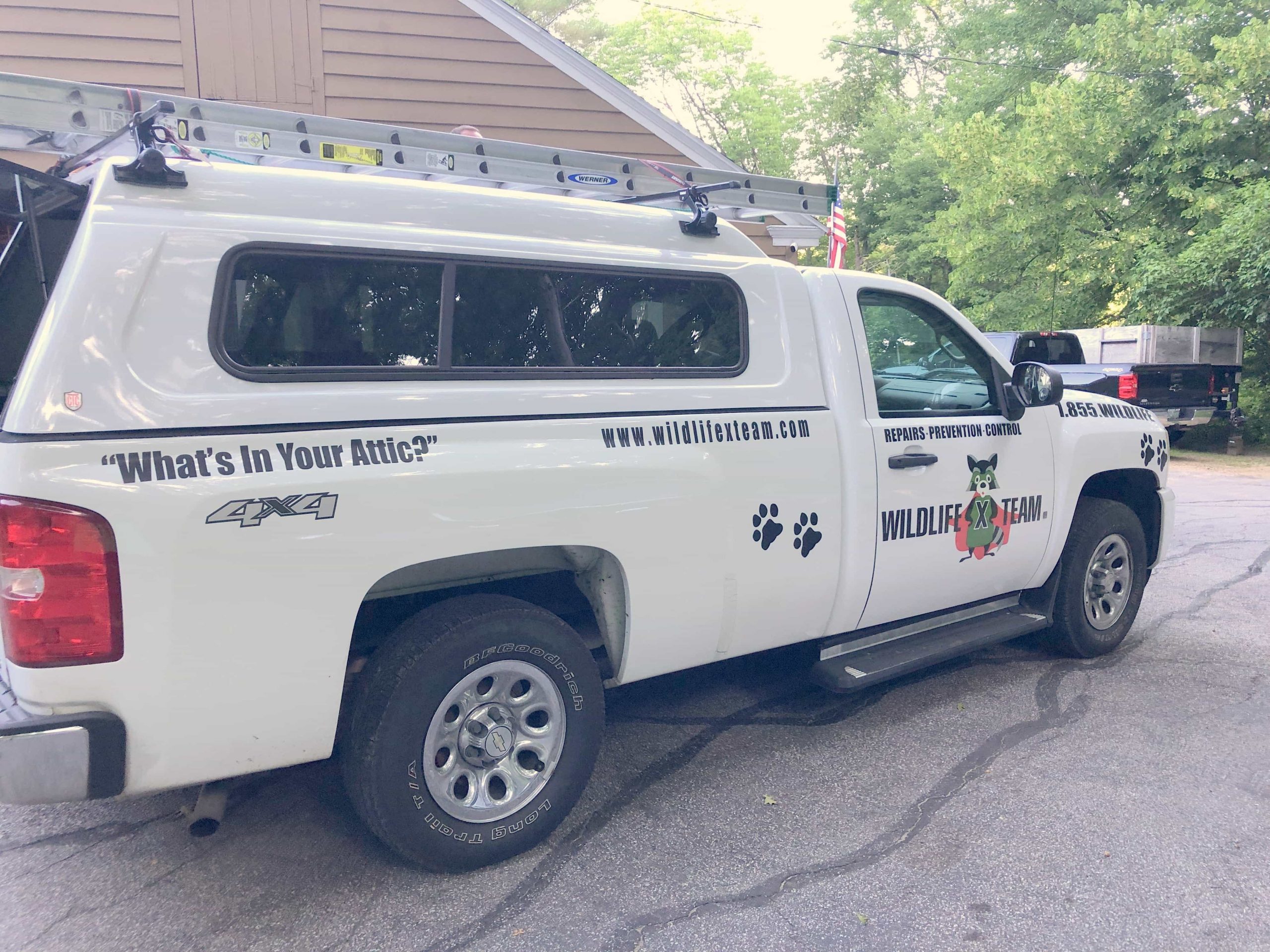Wildlife Removal New Hampshire

Call for Your Exclusive Wildlife Inspection Report.®
SKUNK REMOVAL
Skunks live wherever they desire. When possible, they live in dens where they can cluster, especially in cold weather. Skunks also look out for safe places to raise their young. If they feel threatened, they will spray.
Skunks are a nuisance in a variety of ways. They raid insect larva in yards, raid poultry, and even live under houses. Skunks can enter into crawl spaces and even the house and spray their obnoxious substance, causing a prolonged odor problem.
Some problems caused by skunks are:
- Spraying which causes a prolonged skunk odor problem in the immediate vicinity
- Digging holes all around your yard in search of grubs
- Posing a threat to pets, especially dogs and cats
- Damaging crops, beehives, henhouse, and other places
- Living under human houses in decks and porches
It is important to know that when removing skunks from your property, the essential step is to remove all the elements that attract skunks to your yard. Be sure to remove fallen berries and fruits. Fill up burrows with gravel and cover them with wire fencing.
GENERAL SKUNK TRAPPING
The trapping of skunks is subject to the state’s laws concerning the trapping and killing or relocation of animals. Trapping is an art. It’s a skill, and most trapping attempts fail due to many reasons. It is important to understand the behavior of skunks before trapping. Also, it is important to have an intimate knowledge of the different skunk traps to successfully trap and remove the skunk without incident.
At Wildlife X Team New Hampshire, we offer trapping as part of our skunk control service to the residents of the New Hampshire area. We have different types of traps, and we use the best fitting trap to evict skunks from your property without harming them. We save you the stress of having to select the right trap and bait to use.
OTHER SERVICES
Getting rid of the skunk odor is quite difficult. When you contact us at Wildlife X Team New Hampshire, we fog the affected area with our cleaner, which destroys any organic matter and cleans the atmosphere.
The above is just a little explanation of some of the services we render regarding the removal of skunks. Services like removing dead skunks, dealing with a grave skunk situation, handling a sick skunk problem, and other potential problems are other services we render.
We are just a call away. Give us a call any time, and you’ll surely get a detailed description of how we will solve your skunk problem in New Hampshire. We can get rid of skunks!
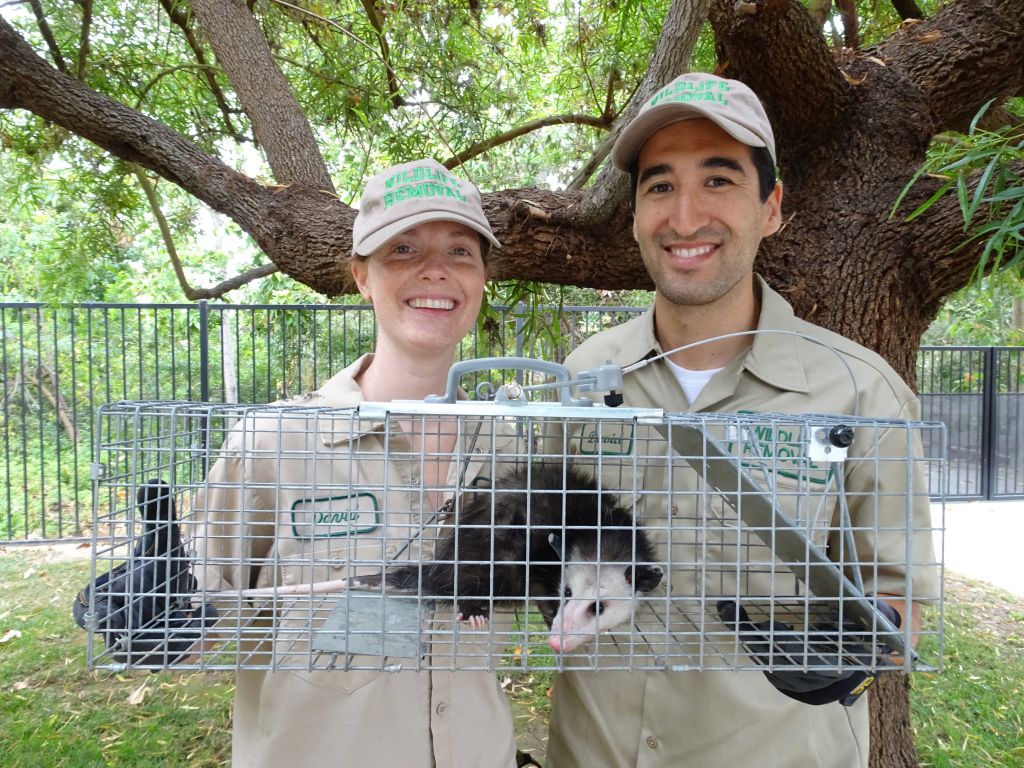
SKUNK PREVENTION
Often in our work at Wildlife X Team New Hampshire, we get calls from homeowners who are having trouble with, yes, you’ve guessed it, a skunk on their property. Skunks tend to get a bit of a bad rep because of that delightful scent they give off. What we always try to keep in mind, however, is that it is only a defense mechanism, and it’s natural. To learn more information about the techniques of getting rid of skunks visit howtogetridofskunk.com.
Still, that doesn’t mean it’s fun to discover a skunk living on your property. So in this article, we thought we’d show you some of our favorite skunk prevention methods, tried and tested to save you time!
So How Can You Keep Skunks Away?
What you need to understand is why and how skunks are getting to your property. Then why is pretty simple, usually, as most wildlife intruders are merely looking for a place to hide and be warm. Throw some food into the bargain, and you’ve got yourself a pretty sweet deal. Well, the skunks do, anyway.
Next, let’s see where skunks are living on your property. Like most wild animals, skunks will look for places they can easily access, but also ones that are fairly uninhabited. They wouldn’t want you walking in on their midnight feast now, would they?
Look for holes and patch them up.
It stands to reason that the best way to keep a skunk out is to seal up any holes and gaps it might crawl in through. The good news here is that skunks are fairly big. We’re not talking about bats or mice, which can crawl in through the tiniest of gaps. So it’s rather easy to spot skunk entry points.
A good way to make sure your property doesn’t attract skunks is to regularly do inspections, especially around the foundation of the home (since skunks are quite likely to get in through there). And whenever you find a hole, take the Wildlife X Team New Hampshire suggestion, and patch it up as quickly as possible. If not skunks, then it will definitely attract some animal, and we’re pretty sure you don’t want that.
Figure out the possible skunk dens.
In order to minimize the appeal of your home to skunks, you need to figure out what’s attracting them in the first place. As we’ve seen, skunks are looking for a nice, easily accessible spot to build their den. These include piles of rocks or wood in the backyard, other debris, or even easily opened trash cans. Once you’ve spotted these possible skunk dens, take the time to tidy up. Remember – the tidier your yard and property, the fewer hiding spots there are for wild animals, and so, the smaller the appeal.
Speaking of trash cans…
Our Wildlife X Team New Hampshire professionals have found that it’s a really good idea to swap your regular trash cans for sealable, difficult to topple ones. After all, it’s a well-known fact that wild animals are drawn to your trash can, seeing it for what it is – a readily available source of food.
So it might be a good idea to seal your leftovers and keep animals away.
Don’t leave pet food out. Remove fallen fruit.
Now that you’ve sealed your trash cans, think about what other easily accessible foods there might be on your property. A rather obvious answer, yet one that people often overlook has to do, of course, with pet food. This is because we’re so accustomed to leaving food and water out for our furry friends, we no longer actively think about it. But maybe we should.
After all, it may well be that that bowl of pet food is what’s attracting skunks to your property in the first place. Similarly, you’ll want to inspect the yard for any fallen fruit, before you go to bed, lest it attracts skunks during the night.
Try a sound or light deterrent.
Although we at Wildlife X Team New Hampshire have heard mixed reviews of such products, it can’t hurt installing a light or sound deterrent. These are devices that are motion-activated, and that let out a loud sound or a bright light if they detect a wild animal on your property. And since skunks are easily scared, it might be enough to keep them away!
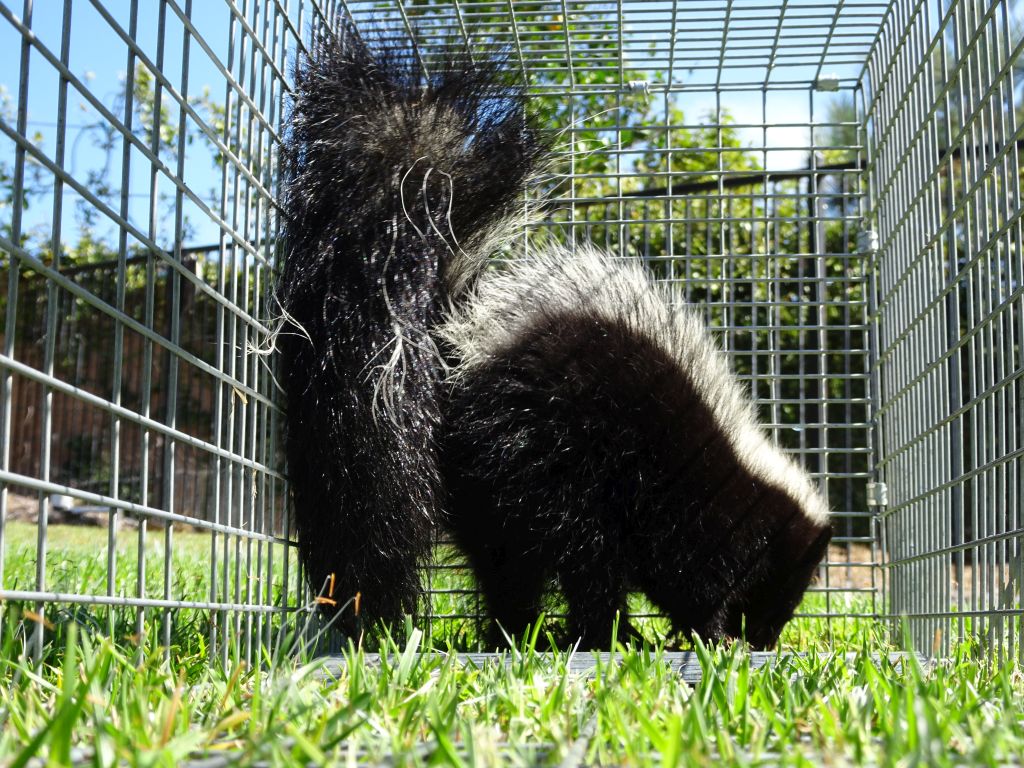
Get Quote for Your Exclusive Wildlife Inspection Report.®


How to Keep Skunks Away from Your Yard
Skunks are interesting creatures, often in ways different than a common person will think. Their biology of foraging at night often makes them difficult to spot and attack directly. Their quest for food can make them destroy your garden, dig up worms, and even scatter the trash.
The painful part is that you only discover the mess a skunk causes at the break of day. Skunks are defensive animals and have a natural escape mode or “annoying their aggressors’.
The two-nozzle opening at their rear releases the most foul-smelling substances on their aggressors. And it is for this reason most humans and animals fear the skunk.
Keeping the Skunk away
Unless you want to soak up in tomato juice and bath yourself in the best perfumes in a valiant effort against a skunk smell, you should do this.
- Install Bright Lights
Too many sudden and bright lights and the skunk gets scared to their bones. Since they are night foragers, they do not enjoy surprises that much or one that has to do with lights. A motion-sensitive floodlight is enough to annoy them off your property.
- Stink the stinker
The irony here is that skunks are repulsed by certain smells – they can’t even take what they give. Certain odors like Citrus, ammonia, mothballs, predator urine (dogs, coyotes, and so on) can scare skunks out of your property.
- Isolate them
Cover it up if you notice a skunk attempting to build a den, nest, or hole. However, you will have to be wise about how you do this. The last thing you want to do is get head-to-head with a skunk. If it gets too serious out there, you can contact us.
Most times, it is best to delegate wildlife duties to us.
- Skunk repellents Granules
There is a particular combination that repulses most pests. These granules can be sprayed smartly around the garden or area. Most of these granules blend effortlessly with the soil, and the skunk will have a hard time separating them.
These granules give off an offensive odor that repulses them and mess with their digestive tract.
- Electric Fence around the garden
Although fencing barely keeps out a determined fence, adding an electric installation will deter them completely. Another method is to use strong wire meshes in constructing your fence around the garden or property.
Ensure these meshes are sunk properly to avoid animals circumventing them from underground.
- Remove all food sources.
Skunks are night scavengers and will feed on anything they can find. Their diet ranges from smaller insects and worms to rummaging for waste foods in the trash. Keeping the property clean of all fallen fruits or waste can save you a lot of skunk-ache.
You can also replace trash cans with sturdy and heavier ones to avoid them falling downwards. You can also replace trash bags with naturally repulsive pests like skunks.
- Keep out Pet foods
Skunks can also scare off your pets and gulp down their feeds. If you are leaving pet food open, you may want to reconsider such action. Also, skunks may colonize any such regions where they continually expect such bounty.
A permanent solution is to keep pet foods in sealed environments or cages.
- Spice up the garden
Most pests are repulsed by the smell or interaction with spices, especially the “hot” ones. You can scare off pests from your garden by preparing a simple mixture of spice-based repellents. Some of the ingredients include;
Jalapeno peppers, cayenne pepper, chopped onions, and so on.
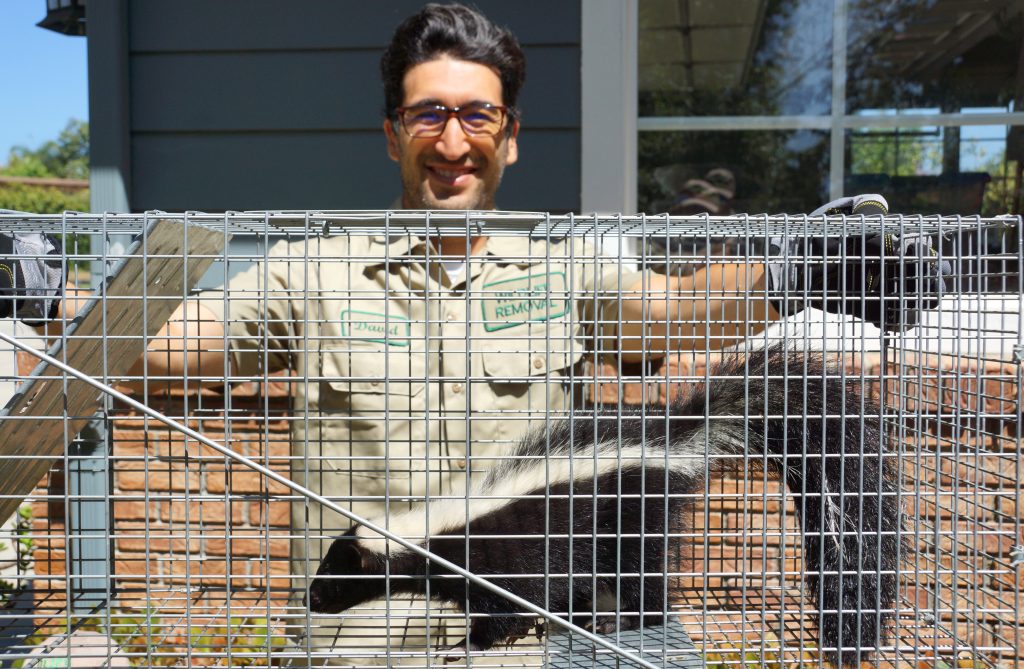
How to Remove Skunks in the Basement
It’s no news that wild critters reside in several parts of the building like basements, chimneys, attics, etc. And if you’ve collected rent from these unwanted guests, maybe you would have cleared off your mortgage by now.
Skunks are a unique breed of nuisance wildlife. Most notably, they are notorious for the foul-smelling spray they emit in self-defense. This foul odor is composed of thiols, a chemical composed of sulfur and hydrogen. And if you’ve ever been skunked, you know precisely how difficult it is to get rid of the smell.
Skunks are also destructive. It’s only a matter of time before the skunk in the basement wreaks havoc on your fruit trees, lawns, vegetable garden, and garbage bin. Moreover, skunks spread lots of diseases, primarily rabies.
Hence, the last thing you want is skunks in your basement! How do you get rid of this notorious wildlife?
But first, let’s explore some of the most common signs of a skunk infestation in the basement.
- Physical sighting – if you see a skunk going in and out of your basement, that’s a surefire sign of an infestation.
- Terrible odor from your basement.
3)Signs of scavenging of garbage bags or pet food sacks.
4) Holes on the lawn.
Getting skunks out of the basement
If you have a skunk in your basement, here are some removal options to consider:
- Exclusion
Exclusion is the preferred technique for getting skunks out of the basement because it is the least invasive method. First off, you must locate all entry holes into your basement. After that, you seal all these up with caulk or hardware cloth, leaving one open.
In the last hole, you install an exclusive device (also known as a one-way door). Once the skunk exits your basement through this device, it cannot get back in. Once you’ve confirmed the skunk is out, you can remove the device and seal up the last hole.
Exclusion works best when you have a single adult skunk in your basement.
- Trapping and relocation
Imagine you have a skunk with her kits residing in your basement. You risk separating the mother from her babies by installing a one-way door. In such instances, trapping might be a better option. Live traps are best used to capture skunks. The babies can be handpicked and used as bait when the mother is out. When their mother returns, she is forced to get into the cage to get access to her kids.
Trapping can also be a great option if you have a nuisance skunk that keeps returning to your property, even after exclusion. The best bait for skunks includes strongly-scented fishes like sardines, mackerel, or cat food. The trap should be placed in areas of high activity in your basement. Do well to check the trap regularly, so you know if it’s caught the animal.
You must take caution when handling a trapped skunk if you do not want to get sprayed. Place a large towel/blanket over the trap before moving it, and try to do it at an angle where the skunk cannot spray you. After that, you can relocate the animal to at least 10 miles away from your property.
Prevention Tips
It’s not enough to remove skunks away from your basement. You must also put measures in place to ensure they do not return to your property. Some of the tips to bear in mind include:
- Eliminate easy access to food on your property. This can be achieved by adequately securing your trash cans, keeping pet food inside, and protecting garden plants.
- Apply repellents. Common repellents include ammonia, black pepper, capsaicin, vinegar, peppermint oil, predator oil, coffee grounds, and lavender.
- Try deterrents like ultrasonic devices and motion-detector lights.
- Install a fence if you can afford it.
WILDLIFE X TEAM NEW HAMPSHIRE SERVICE AREAS
Wildlife X Team services the areas around New Hampshire, including:
Laconia, Meredith, Alton Bay, Alton, Ossipee, Center Harbor, Center Tuftonboro, Gilmanton, Gilmanton Iron Works, Holderness, Rumney, Lochmere, Loudon, Newfound Lake, Moultonborough, Gilford (Govt. Isl), Plymouth, Danbury, Hebron, Tilton, Winnisquam, Wolfeboro, Ashland, New Hampton, Bristol, Andover, Salisbury, Wolfeboro Falls, Belmont, Hill, Bridgewater, Grafton, New London, Sunapee, Wilmot, Holderness, Franklin, Squam Lake, Sanbornton, Lake Winnipesaukee, Sunapee Lake, and Silver Lake.
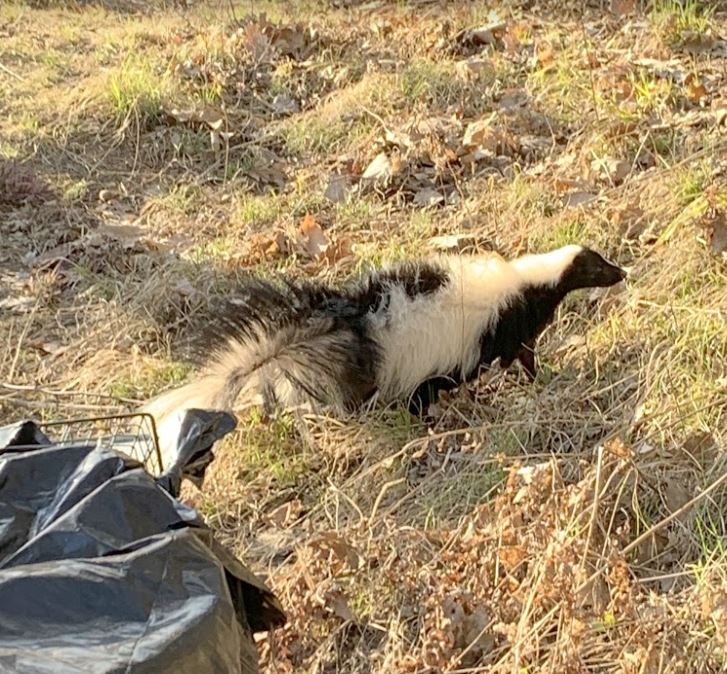
Call for Your Exclusive Wildlife Inspection Report.®


